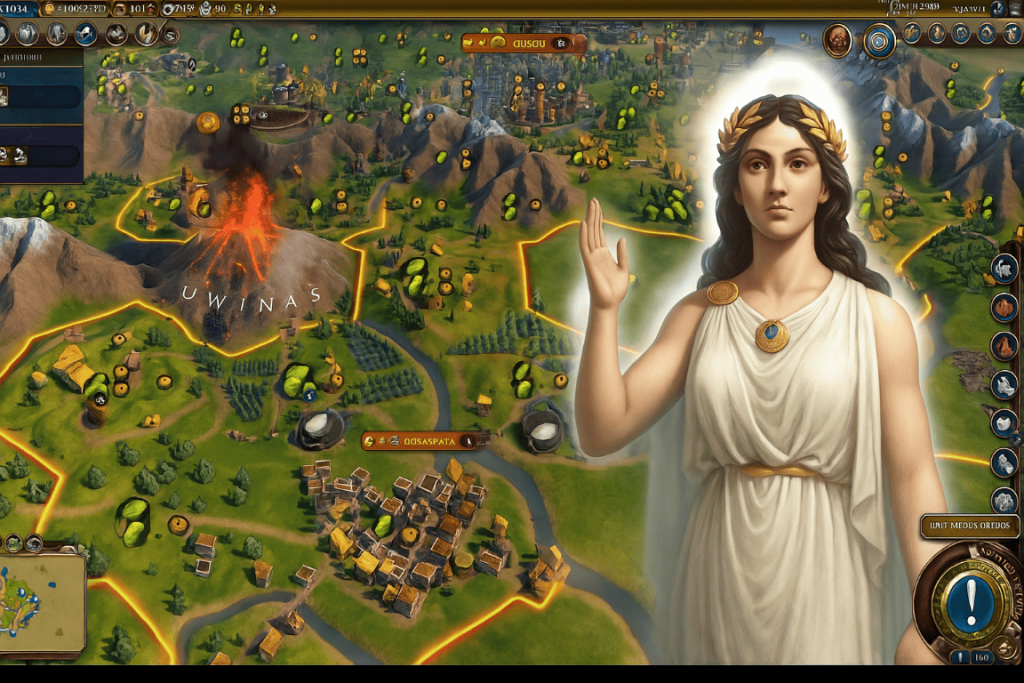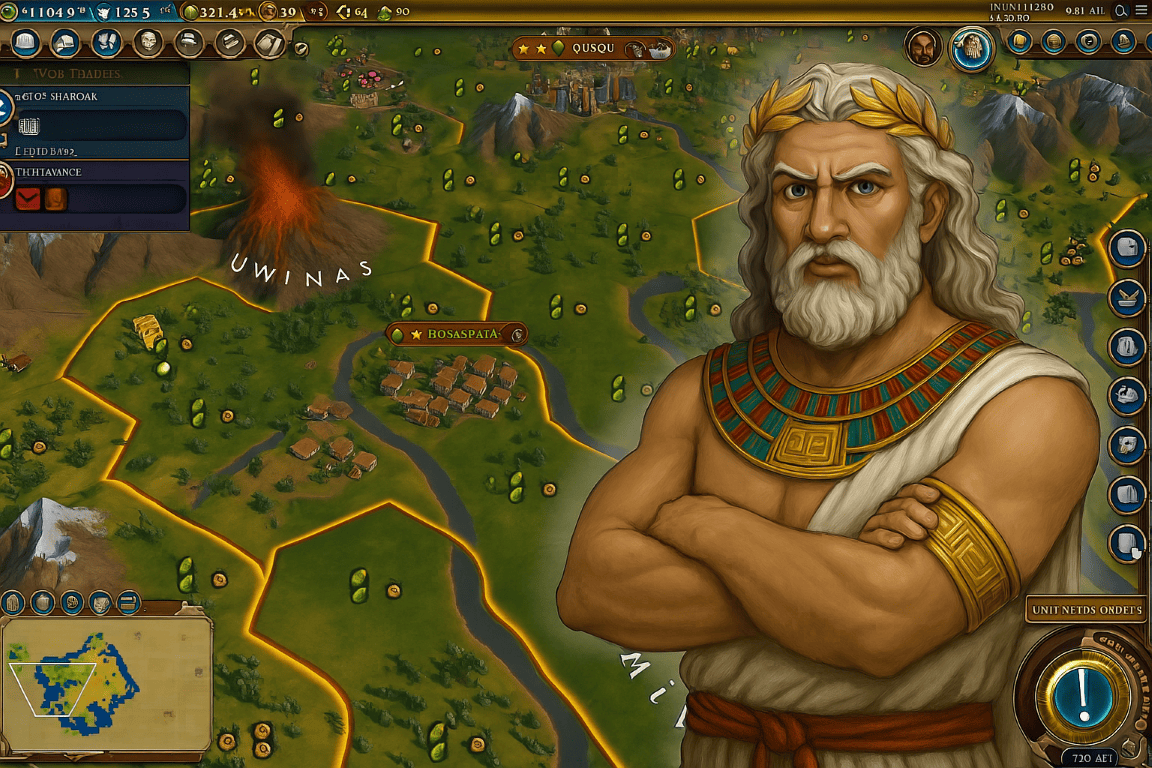I’ve been wanting to share my playbook for how I finally started winning consistently on Deity in Civilization VI. It felt impossible for the longest time, like the AI had every advantage. But I realized I wasn’t just playing poorly, I was playing the wrong game entirely. On Deity, you have to be aggressive, efficient, and think a few steps ahead in a way you just don’t on lower difficulties.
So, I’ve boiled down everything I’ve learned into these 10 core strategies. This isn’t just a list of tips; it’s a new way of thinking about the game that helped me conquer its biggest challenge. It’s time to unlearn some old habits and adopt a Deity mindset.
1. Scripting Your First 30 Turns: The Hyper-Efficient Opener
The first 30 turns on Deity are a frantic scramble for survival. You can’t afford to be passive. The AI starts with a huge lead, so any mistake can end your game before it even begins. Your opening has to be a tight, practiced routine focused on one thing: not dying.
My go-to build order is almost always Scout -> Slinger -> Slinger. You absolutely need that Scout to see what’s around you, find good spots for your next cities, and meet city-states for those crucial early envoys. The two Slingers are your early defense. The second a Barbarian camp pops up or a neighbor like Montezuma gives you a funny look, these units (which you’ll upgrade to Archers ASAP) will save your skin.
Your research needs to be just as focused. Bee-line for Archery. This might mean grabbing Animal Husbandry or Pottery first, depending on your start, but getting Archers is the priority. An army of three Archers can fend off almost any early attack the AI throws at you. They might have more units, but they’re clumsy with them. This disciplined start means delaying things like Monuments or Builders, but it guarantees you’ll be around to build them later.
2. Every Adjacency Point Matters: Maximizing Yields from the Start
I used to be careless with where I placed my districts. On Deity, that’s a luxury you can’t afford. Every single adjacency bonus is a precious resource that adds up over the game. Before I even settle my second city, I have a rough plan for how my districts will create powerful clusters.
Think about specializing your cities based on the terrain. Mountains are perfect for a high-adjacency Campus or Holy Site. A good harbor location is ideal for a Commercial Hub and Harbor combo. The real magic happens when you use other districts to boost your key ones. Aqueducts, Dams, and Canals can supercharge an Industrial Zone. A well-placed Government Plaza can give a permanent boost to several surrounding districts.
I stopped thinking of my empire as a bunch of separate cities and started seeing it as one big, interconnected machine. One city might be my main science hub, but its neighbor’s job is to give that Campus a +2 adjacency bonus. This kind of detailed planning is what separates a struggling empire from a dominant one.
3. The “Timing Push”: Winning Wars Before They Even Start
Trying to fight a long, drawn-out war with the Deity AI is a losing battle. They just have too many units. The secret to warfare on Deity is the “timing push.” You exploit a temporary technological advantage to launch a quick, decisive strike before the AI can catch up.
This means planning your tech and civic trees carefully and saving up gold for upgrades. Early on, a rush with Archers, Swordsmen, or Horsemen can be devastating. A bit later, a wave of Crossbowmen can be a game-winner. The goal is to unlock a key military tech, upgrade a handful of units instantly, and overwhelm an enemy city before they know what hit them. You’re not trying to conquer the world at once, just to cripple a rival, grab some valuable cities, and set yourself up for success.
4. Weaponizing Loyalty: Taking Cities Without Firing a Shot
The loyalty system is one of my favorite tools for expansion on Deity, especially with a leader like Eleanor of Aquitaine. Instead of fighting costly wars, you can literally steal cities by applying overwhelming loyalty pressure. It’s a more subtle, long-term strategy, but it’s incredibly effective.
The basic idea is to settle your cities close to your target and grow your population as fast as possible. Big cities exert a lot of loyalty pressure. This gets even stronger when you’re in a Golden Age and your opponent is in a Dark Age. I actively try to time my Golden Ages to coincide with my neighbors’ Dark Ages for this very reason.
Don’t forget your Governors. Amani, with her “Emissary” promotion, is a loyalty-flipping machine. The “Bread and Circuses” project in an Entertainment Complex is another great way to radiate pressure. By stacking these effects, you can create a domino effect of rebellions, absorbing an entire empire without ever declaring war.
5. Mastering the Era Score Game: Engineering Your Golden Ages
Golden Ages aren’t just a nice perk on Deity; they’re essential. The powerful dedications they unlock, like Monumentality (buy civilians with Faith) or Free Inquiry (science from Commercial Hubs), can give you the surge you need to pull ahead. Falling into a Dark Age, on the other hand, can be a death sentence. That’s why I’m always actively managing my Era Score.
I’m constantly looking for ways to earn those precious points: circumnavigating the globe, clearing Barbarian camps, building a unique unit, or converting a city-state. A more advanced trick is to “bank” Era Score. If I’m already set for a Golden Age, I might hold off on finishing a wonder or recruiting a Great Person until the next era. That way, I get a head start on the next Golden Age, letting me chain them together for a long period of accelerated growth.

6. The Art of the Deal: Milking the AI for All They’re Worth
For all their advantages, the Deity AI is surprisingly bad at making deals. I’ve learned to use trade to fund my entire empire with my opponents’ money.
They’ll pay a fortune for luxury resources they don’t have. I always sell my duplicates for a lump sum of gold, especially if I think I might go to war with that civ later (which cancels gold-per-turn deals). They’re also desperate for diplomatic favor early on, and I’m happy to sell it to them.
I also sell my excess strategic resources. Once I have a good stockpile of Horses, Iron, or Niter, I sell the rest. It gives me gold and can slow down their ability to build powerful units. I check the trade screen every single turn to see what deals are available. It’s tedious, but it can be the difference between a bankrupt empire and a thriving one.
7. The “Chopping” Revolution: Creating Massive Production Spikes
Production is everything on Deity, and one of the best ways to get a huge burst of it is by “chopping” forests and rainforests with a Builder.
The key is to use the Magnus governor with his “Provision” promotion, which increases the yield from chops by 50%. It’s a game-changer. The amount of production you get also scales with your tech and civic progress, so a chop in the Industrial Era is worth way more than one in the Ancient Era.
I’ve learned to save my forests, especially on hills, for when I really need a production spike. This could be to rush a critical wonder, pump out an army for a timing push, or get a new city up and running quickly. A city with Magnus and a few forested hills is like a production time bomb waiting to go off.
8. Faith as a Flexible Currency: More Than Just Religious Victory
I used to think Faith was only for Religious Victories. On Deity, it’s one of the most flexible and powerful resources in the game, no matter how you’re trying to win. A strong Faith income can give you a huge edge in science, culture, or domination.
The most obvious use is buying Great People. I build Holy Sites just so I can generate enough Faith to snatch up key Great Scientists, Engineers, and Writers before the AI can get them.
With the right beliefs and Golden Age dedications, Faith becomes even more powerful. The Monumentality dedication lets you buy Builders and Settlers with Faith, which is amazing for rapid expansion. The Jesuit Education belief lets you buy Campus and Theater Square buildings with Faith. This means you can build a Holy Site in a new city and then use its Faith to instantly buy a Library and University.
9. The Counter-Intelligence Game: Crippling Your Rivals with Spies
Once you hit the Renaissance Era, spies become one of your most important tools for leveling the playing field. The AI is incredibly vulnerable to espionage, and a good spy network can sabotage their progress, steal their tech, and even stir up rebellions.
I always send my first spy to my most advanced rival to steal technology boosts. It can save you dozens of turns of research. As I get more spies, I have them sabotage production, drain gold, and listen for gossip to get a diplomatic edge. A favorite tactic of mine is to send a spy to a city with a Spaceport and just keep sabotaging their rocketry efforts. It’s a great way to slow down a Science Victory and buy yourself more time.
10. The “Good Enough” Defense: Surviving with Minimal Investment
You are going to get declared on in Deity. It’s just a fact of life. But if you over-invest in a huge army early on, you’ll cripple your economy and fall even further behind. The key is to build a “good enough” defense – just enough units to survive an attack by using terrain and smart tactics.
Like I said before, a core of three Archers can handle most early-game attacks. The trick is to use the terrain to your advantage. Put your Archers on hills and behind rivers. Fortify them. The AI is terrible at focusing its fire, but you should always focus yours to take out one enemy unit at a time.
Building walls in your border cities is also a great, low-investment way to boost your defense. The goal isn’t to wipe out the enemy army, but to make it so costly for them to take your city that they eventually give up and sue for peace. This lets you survive the early game without sacrificing your long-term growth.
Winning on Deity is a journey of precision, planning, and exploiting every advantage you can find. It’s about shifting your mindset from passive growth to aggressive optimization. Once you internalize these strategies, you’ll find that the challenge of Deity becomes a deeply rewarding puzzle. The AI’s advantages are predictable; your ability to adapt and execute is what will lead you to victory. Now go lead your people to glory.


